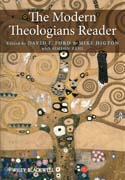
The Modern Theologians Reader is an outstanding selection of the key writingsin modern theology, with each extract introduced and annotated to support student learning. A unique stand-alone text which can also be used alongside the highly successful textbook, The Modern Theologians Features introductory notesand annotations with each extract to help students understand the relevance and importance of the reading Includes selections from major 20th-century theologians and theological movements, and texts on Christian theology's relation to science, globalization, and other faiths such as Buddhism and Judaism ÍNDICE: Introduction. Part 1: Classics of the Twentieth Century. Chapter 1: Karl Barth. 1. The Theme of the Epistle to the Romans. 2. Jesus Christ, Electing and Elected. Chapter 2: Dietrich Bonhoeffer. 1. Ultimate and Penultimate Things. 2. Letters and Papers from Prison. Chapter 3: Paul Tillich. 1.The Actuality of God: God as Being and Living. 2.The Meaning of Salvation. Chapter 4: Henri de Lubac. 1.Surnaturel: Divine Exigence and Natural Desire. 2.Allegory, Sense of the Faith. Chapter 5: Karl Rahner. 1. God of My Life. 2. What Does ItMean to Say: God Became Man?. Chapter 6: Hans Urs von Balthasar. 1. Christs Mission and Person. 2. Dramatic Soteriology. Part 2: Theological Responses to Modernity in Europe and the USA Section A Germany. Chapter 7: Wolfhart Pannenberg. 1.The Significance of Jesus Resurrection. 2.The World as the History of God and the Unity of the Divine Essence. Chapter 8: Jürgen Moltmann. 1. The Resurrection and the Future of Jesus Christ. 2. Trinitarian Theology of the Cross.Section B Britain. Chapter 9: T.F. Torrance. 1. The Nature of Justification. 2. The Knowledge of God. Chapter 10: Anglican Theology. 1. Donald MacKinnon, Atonement and Tragedy. 2. Rowan Williams, The Judgement of the World. Section CUSA. Chapter 11: The Niebuhrs. 1. H. Richard Niebuhr, Christ the Transformer of Culture. 2. Reinhold Niebuhr, The Conflict between Individual and Social Morality. Section D The Contemporary Scene: Reappropriating Traditions. Chapter 12: Revisionists and Liberals. 1. Alfred North Whitehead, The New Reformation.2. Schubert Ogden, The Reality of God. Chapter 13: Postliberal Theology. 1. George Lindbeck, Excursus on Religion and Truth. 2. Hans Frei, Description of Type 4 Theology. Chapter 14: Systematic Theology after Barth: Jüngel, Jenson, and Gunton. 1. Eberhard Jüngel, God, the Dead Jesus, Love, and Freedom. 2. Robert Jenson, The Great Communion. Chapter 15: Roman Catholic Theology after Vatican II. 1. Bernard Lonergan, The Transition from a Classicist World-View to Historical-Mindedness. 2. John Paul II, Redemptor Hominis (Redeemer of Humankind) on Fear,. Progress, Human Rights and Vocation. Section E Texts, Truth and Signification. Chapter 16: Biblical Interpretation. 1. Rudolf Bultmann, New Testament and Mythology. 2. Paul Ricoeur, The Summoned Subject. Chapter 17: Philosophical Theology. 1. Ingolf Dalferth, The Rationality of Theology. 2. Alvin Plantinga, Warranted Belief in God. Chapter 18: Postmodern Theology. 1. Michel de Certeau, The Weakness of Believing. 2. Jean-Luc Marion, The Formal Reason for the Infinite. Part 3: Theology and the Sciences. Chapter 19: Theology and the Natural Sciences. 1. John Polkinghorne, Belief in God in an Age of Science. 2. Nancey Murphy, Divine Action in the Natural World. 3. Pierre Teilhard de Chardin, The Ultimate Earth. 4. John Haught, Darwins Gift to Theology. Chapter 20: Theology and the Social Sciences. 1. Ernst Troeltsch, Conservative and Revolutionary Tendencies within the Church. 2. Jo
- ISBN: 978-1-4051-7110-6
- Editorial: Wiley-Blackwell
- Encuadernacion: Rústica
- Páginas: 488
- Fecha Publicación: 18/11/2011
- Nº Volúmenes: 1
- Idioma: Inglés
